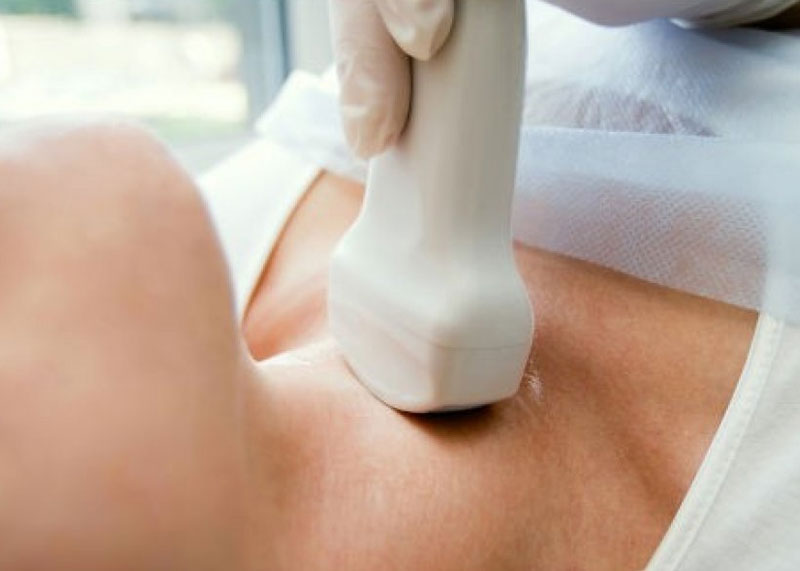Fine needle thyroid biopsy
- The cornerstone in the assessment of a solitary thyroid nodule is a procedure known as thyroid fine needle aspiration cytology or thyroid biopsy
- A thyroid biopsy is a procedure in which a small sample of tissue is removed from the thyroid gland and looked at under a microscope
- Thyroid biopsy is valuable in the assessment of thyroid disease
What is a fine needle biopsy?
- A tiny needle, similar to an acupuncture needle, is inserted into the thyroid nodule and moved up and down a few times
- The tip of the needle extracts tiny pieces of tissue which can then be placed on a glass slide, smeared, stained and interpreted by a cytopathologist
- The entire nodule cannot be sampled with one tiny needle – two or more additional needles will have to be inserted into different areas of the nodule to obtain representative samples
- This will enable the cytopathologist to assess whether the nodule should be removed or not
- Some of the nodules are cystic as a result of previous bleeding into the nodule – in this situation as much of the fluid as possible will be removed
Thyroid fine needle aspiration cytology can accurately diagnose several thyroid conditions including:
- Thyroid colloid nodules
- Thyroiditis
- Papillary thyroid carcinoma
- Medullary thyroid carcinoma
- Anaplastic thyroid carcinoma
- Lymphoma
Thyroid biopsy
- When performed properly, the testing has a false negative rate of less than 5%
- This means that a positive finding, such as cancer, will be missed fewer than five times out of 100
- The fine needle aspiration is also performed to treat thyroid cysts
- A thyroid cyst is a fluid-filled sac within the thyroid gland
- Aspiration of the cyst with a needle and syringe can shrink the swelling from the cyst and the fluid removed can be analyzed for cancer
- The limitation of thyroid cytology is the inability to distinguish between benign and malignant follicular neoplasms
- Around 20% of thyroid nodules with indeterminate cytology turn out to be malignant on definitive surgical pathology, therefore surgical treatment remains the standard of care
How to prepare for a thyroid biopsy
Tell your doctor if you:
- Take any medicines regularly – be sure your doctor knows the names and doses of all your medicines
- Are allergic to any medicines, including anaesthetics
- Have had bleeding problems or take blood-thinners, such as aspirin or warfarin
- Before having a thyroid biopsy, you may need to have blood tests to see whether you have any bleeding problems or blood-clotting disorders
To prepare for a thyroid biopsy:
- You do not need to do anything before a needle biopsy – you will be awake during the biopsy
- Before having a thyroid biopsy, you need to sign a consent form that says you understand the risks of the thyroid biopsy and agree to have the test done
- Talk to your doctor about any concerns you have regarding the need for the test, its risks, how it will be done, or what the results will mean
How long does the thryoid biopsy take?
- The actual fine needle biopsy takes only a few seconds.
- The whole episode takes about 20 to 30 minutes
- If the nodule is difficult to feel or biopsy, an ultrasound machine may be necessary to guide the needle into the nodule
Needle biopsy
- Before the biopsy, your doctor cleans the skin over your thyroid gland with a special soap
- Your doctor may use an ultrasound to guide the placement of the needle – he or she will put a thin needle into your thyroid gland and take out a small amount of thyroid tissue and fluid and the tissue is looked at under a microscope
- During a needle biopsy, you may feel a quick sting or pinch in your neck
- A small bandage is placed over the area where the needle was inserted
- You may find it uncomfortable to lie still with your head tipped backward after the biopsy and the biopsy site may be sore and tender for 1 to 2 days
- You can take panadol for any discomfort
Are there any complications?
- Complications are uncommon except for bleeding into the nodule
- To minimise the risk of bleeding with fine needle biopsy, tiny needles are used and the doctor will ask you to hold your breath for a few seconds during the procedure
- If complications do occur after the fine needle biopsy, please contact your doctor for advice
- Bleeding more often occurs spontaneously into the nodule and when this happens a lump may suddenly appear in the neck
- Ongoing bleeding can be a problem for people with bleeding disorders, or those taking Aspirin or warfarin and other blood-thinning medicines – your doctor will give you specific instructions on when to call with problems
Biopsy results
- A thyroid biopsy is a procedure in which a small sample of tissue is removed from the thyroid gland and looked at under a microscope for nodules, infection, cancer or other thyroid problems
- Results from a thyroid biopsy are usually available in a few days
- You will need to make a follow-up appointment with your doctor after the biopsy to obtain the results
If you have any questions about thyroid disease or thyroid biopsy contact your local doctor who will arrange to contact your thyroid surgeon.

